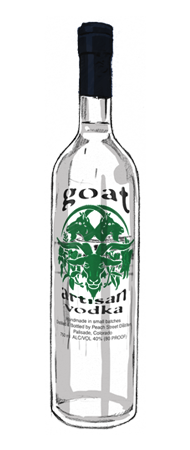 The USPTO refused Peach Street Distillers’ application for “GOAT ARTISAN VODKA” on the basis of likelihood of confusion with various registrations containing the word “CABRON” that are owned by Cabron Family Holdings, Inc. The Examiner alleged that the English translation of “cabrón” is “goat” and that the application should be refused for likelihood of confusion in accordance with the doctrine of foreign equivalents.
The USPTO refused Peach Street Distillers’ application for “GOAT ARTISAN VODKA” on the basis of likelihood of confusion with various registrations containing the word “CABRON” that are owned by Cabron Family Holdings, Inc. The Examiner alleged that the English translation of “cabrón” is “goat” and that the application should be refused for likelihood of confusion in accordance with the doctrine of foreign equivalents.
OLG found ample evidence in dictionaries suggesting that other Spanish words are more commonly used when referring to goats. The Examiner attempted to focus on dictionaries that only supported the USPTO’s position, such as food dictionaries, and did not show entries of the other Spanish words in the cited sources that Applicant argued could be equally used, or even preferred, to mean “goat.”
 In addition, OLG presented strong evidence in the form of news articles, dictionaries, and other publications that “cabrón” has a well-known colloquial meaning that is vulgar. In fact, CABRON brand tequila cannot be sold in Mexico due to this well-known secondary definition, despite the brand owner’s arguments that the primary meaning of the mark is “goat.”
In addition, OLG presented strong evidence in the form of news articles, dictionaries, and other publications that “cabrón” has a well-known colloquial meaning that is vulgar. In fact, CABRON brand tequila cannot be sold in Mexico due to this well-known secondary definition, despite the brand owner’s arguments that the primary meaning of the mark is “goat.”
The cited CABRON registration could be challenged on the grounds that it should have been refused registration under Section 2(a) of the Lanham Act, which forbids registration of immoral or scandalous matter. However, with the successful outcome, a separate cancellation proceeding was unnecessary.
In light the evidence presented, OLG was able to demonstrate that the average consumer would not “stop and translate” CABRON into GOAT and that no likelihood of confusion would result between the CABRON family of marks and GOAT ARTISAN VODKA. Registration was permitted.
